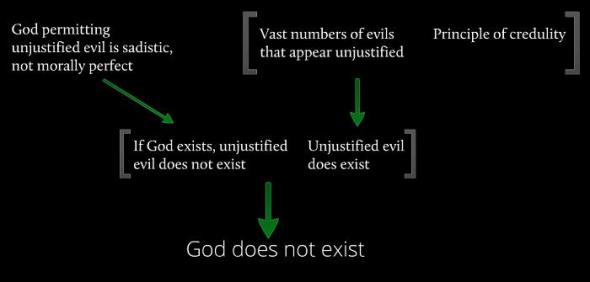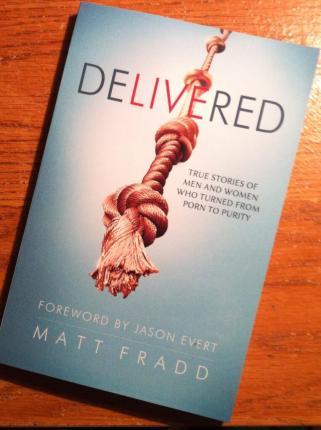The Problem of Evil
40July 9, 2013 by mattfradd
The problem of evil is the greatest emotional obstacle to belief in God. It just doesn’t feel like God should let people suffer. If we were God, we think, we wouldn’t allow it.
The atheist philosopher J. L. Mackie maintained that belief in God was irrational, for if God were all-knowing (omniscient) he would know that there was evil in the world, if he were all-powerful (omnipotent) he could prevent it, and if he were all-good (omnibenevolent) then he would wish to prevent it. The fact that there is still evil in the world proves that God doesn’t exist, or if he did, that he must be “impotent, ignorant, or wicked.”
As keenly-felt as the problem of evil may be, however, it doesn’t represent a strong intellectual or logical obstacle to God’s existence. Mackie was wrong: the existence of God and the existence of evil aren’t mutually exclusive. Let’s look at the three attributes of God that Mackie named.
Omnipotence
As we noted in the prior answer, omnipotence doesn’t mean the ability to do what is logically impossible. It’s possible, therefore, for God to create beings with the kind of free will that can choose between good and evil, but he can’t also force those creatures to freely choose good. If he forced their choice, it wouldn’t be free.
C.S. Lewis put it this way, “If you choose to say, ‘God can give a creature free will and at the same time withhold free will from it,’ you have not succeeded in saying anything about God.”
Omniscience
If God has infinite knowledge then he knows many things we don’t. This means that he may, in fact, have good reasons for permitting things-like evil and suffering-that seem inexplicable to us.
Human beings have a very limited vantage point, and so we often lack knowledge of things of true significance. What appears to us to be a tragedy may have effects that bring about great good, and conversely what appears to us as a good thing may, in the long run, prove harmful.
Consider the analogy of a small child being taken to the doctor for his immunization shots. He knows the needle hurts, and he can’t understand why his own parents are allowing the doctor to cause him pain, that the inoculations help prevent the much greater suffering of disease. He’s unable to perceive the greater good.
Likewise, we should recognize that a being with more knowledge than us, like God, may have good reasons for things, even pain and suffering, that we are unaware of. And so he allows evil to exist because of his omniscience, not in spite of it.
Omnibenevolence
As we think about the goodness of God, we must be careful not to impose on him our inadequate understandings of what goodness is. In his book The Problem of Pain, C.S. Lewis writes, By the goodness of God we mean nowadays almost exclusively his lovingness; and in this we may be right. And by love, in this context, most of us mean kindness. . . . What would really satisfy us would be a God who said of anything we happened to like doing, ‘What does it matter so long as they are contented?’ We want, in fact, not so much a Father in heaven as a grandfather in heaven, a senile benevolence who, as they say, ‘liked to see young people enjoying themselves’ and whose plan for the universe was simply that it might be truly said at the end of each day, ‘a good time was had by all'”
Furthermore, most theists do not believe that God created us merely for happiness in this life, but also, and most importantly, for eternal happiness with him in the next. So, his omnibenevolence should be judged neither by our limited human standards of goodness nor by what happens in this world alone.
Putting these things together, we can recognize that an omnipotent, omniscient, and omnibenevolent creator might have good reasons for tolerating abuses of human free will that lead to evil and suffering.
We may not know what all his reasons are, but we sense the value of freedom, including the value of being able to choose good freely rather than by compulsion.
We can see how in both his power and knowledge can bring good out of evil in ways that we, in our limits, aren’t always able to comprehend. But in faith we can say along with St. Paul, “We know that in everything God works for good with those who love him” (Rom. 8:28).
Evil, An Argument for God
In fact, rather than disproving God’s existence, the reality of evil actually points to it, in an indirect way. If evil exists, then it follows that morality exists. If morality exists, then it follows that God exists.
Moral laws point to a moral law-giver. It’s only within a moral framework that the sufferings of this life can have any meaning. It may be a mystery why an all-good God allows suffering and evil to take place, but at least on this view there is meaning and purpose and God can ultimately bring about justice and draw good out of the sufferings of this life.











hmmmmm, guess I just always figured God is – and left it at that!
The two words “Free Will” are often my answer to questions about the existence or intention of God.
On “Omnibenevolence”, the movie “Bruce Almighty” showed a lighthearted demonstration of one point you touched on. In answer to millions of prayer requests he says “YES TO ALL”, which of course leads to all kinds of unhappiness.
I am a firm believer that everything happens for a reason. There are no coincedences. God exists and is active in all our lives.
So timely! Thank you for this post! We’ve been discussing just this thing in our middle-school Bible Study. Something we ponder all our lives, especially in times of great suffering – definitely a mystery.
One of the truly great Doctors of the Church, St. Thomas Aquinas, gives us an explanation of the existence of evil in the fourth of his Five Ways to know the existence of God, the Argument from Degree. In it, he says
The fourth proof arises from the degrees that are found in things. For there is found a greater and a less degree of goodness, truth, nobility, and the like. But more or less are terms spoken of various things as they approach in diverse ways toward something that is the greatest, just as in the case of hotter (more hot) that approaches nearer the greatest heat. There exists therefore something that is the truest, and best, and most noble, and in consequence, the greatest being. For what are the greatest truths are the greatest beings, as is said in the Metaphysics Bk. II. 2. What moreover is the greatest in its way, in another way is the cause of all things of its own kind (or genus); thus fire, which is the greatest heat, is the cause of all heat, as is said in the same book (cf. Plato and Aristotle). Therefore there exists something that is the cause of the existence of all things and of the goodness and of every perfection whatsoever—and this we call God.
The Problem of Evil
Within the Fourth Way, we understand that there are degrees of perfection, some things being truer, nobler, better than other things, and therefore there must be something that is absolutely true, noble, and good that is the source of all that is good, noble, and true. This we call God.
Within this we find where evil arises. For God to have created something that was absolutely, in act, good, He would have been creating/cloning Himself. However, God is simple. He has no composite parts. He is all actuality, and cannot move from potential, which He has none, to act, which He has all. (Thus, the origin of his name I AM. He is being itself). To be composite is to be in potency, and God is all act. Therefore, it is a metaphysical impossibility for God to create something that is good as its final cause, which is the purpose for which He created us, without that thing moving from potency to act. A created thing is never the equal to the thing that created it. We see that all things grow from immaturity to maturity. That which is not purely good in act is potentially good, and can be, but is not guaranteed this state without the cooperation with grace that is the mystery of faith, worked out in this life.
Since some use their free will to choose to resist grace, they do not reach the potential to be good, and are thereby prey to evil. Evil is not a true potency, but a lack of movement from potency to act. It is a stifling of one’s final cause, which is to be completely virtuous.
So, there is one thing God could not do, which is to clone Himself, to create another infinitely good being. So He created all things with the potential, embedded in its nature, to be good and to participate in the utter joy He experiences. This is a most worthy endeavor, and probably the first stumbling block we have is our own pride. This movement from the potential to the actual can only be accomplished through humility. Very interestingly, Pope Francis just with the last few days has told us to embrace humility “from head to toe.”
There is absolutely no evidence that any supernatural being exists. This does not exclude the possibility that such a being does actually exist, but believing in the absence of evidence is irrational. We know nothing about any such being, not even that it created our known universe. Therefore, ascribing any attributes such as omni-whatever to this hypothetical being is irrational and without foundation. One can build the most beautiful logically consistent structures on false premises. If the premise is false, the whole structure comes tumbling down like a house of cards. By all means, believe in God if you so wish but know that such belief is not rational, even if He does actually exist!
By all means, believe in God if you so wish but know that such belief is not rational, even if He does actually exist!
That is why it is called Faith.
No, no no. I see where you are coming from but to concede that faith is irrational is itself heretical. As Vatican I declared, we CAN know by human reason alone that God exists. There are good arguments for the existence of God. 🙂
I’m sorry, I did not mean to state Faith is irrational.
I know you don’t Kat. Sorry if my correction came across as harsh. 🙂 Thanks for your input.
“but believing in the absence of evidence is irrational.”
Absence of evidence is not evidence of absence. However, there are good arguments for the existence of God that deal with the origin of the universe (Cosmological arguments), the fine tuning for human life argument, objective moral values…….You can deal with these arguments or just dismiss them as so many atheists do
But all that is beside the point. The OP is dealing with the problem of evil.
“absence of evidence …” Indeed, this is what I wrote – read my comment again. However, my argument is on topic. The blog entry starts off with the premise that God exists and is imbued with a number of omni-whatevers. There is NO basis for this premise.
Matt Fradd, your writings are greatly appreciated and I value them very much. Keep up the good work and may God Bless you.
vuurklip’s problem is that he is approaching the subject from a truncated and illogical direction. Atheists use the scientific method as a hammer to bludgeon theists, by positing that if the evidence is not found using the scientific method, it is not valid knoweldge. However, the problem of God is not a scientific one, but a philosophical problem. Philosophy includes both physics and metaphysics. The scientific method cannot address metaphysics, beyond physics, for that is a contradiction in terms. The scientific method was devised by Descartes and Galileo in order to give man control over nature. Atheists have forgotten that, and tried to create a metaphysics out of it. In the process, they have become incoherent and inconsistent. Returning to the problem of evil (!), a materialist believes all things can be reduced to the material. Everything we see are actually elementary particles arranged in a certain manner under the auspices of the forces that govern them. Therefore, there is no good or evil, just particles arranged in a certain manner. The Newtown massacre, according to an honest materialist, was just the rearrangement of particles into a less organized state. Only a theist position has good and evil, and I would posit that the explanation I outlined makes sense, whereas a materialist can give no explanation for good or evil at all. In their reality, Stalin got away with the murder of the Ukraine population. A murderer who is not caught? So what? If you decide to do what most people call evil, big deal. If you got away with it, you win.
This is true irrationalilty. This is incoherent and inconsistent, for atheists habitually harrangue about the evils theism has wrought, but by their definition of reality, there is no evil. This is something they cannot escape, and it explains the strawman arguments the New Atheists construct as a means to deflect the incoherency of their position. You csannot be a materialist without resorting to reductionism, and reductionism leads to an incoherent world.
Your rant against atheists is beside the point even if some of the accusations are true. The issue is about trying to understand the existence of evil. The blog entry does not explain this because it starts off with the premise that God exists and is imbued with a number of omni-whatevers. This premise is without any foundation and therefore it would be irrational to accept this, even though it may be correct.
My rebuttal was to the point: you are using the scientific method as a rule of thumb, all-inclusive mode of investigation of reality, and that is a common mistake atheists use when approaching the issue of God. The evidence is ample. If you don’t accept the evidence, be honest and say that it doesn’t fit into your worldview. The only problem is that your worldview doesn’t explain all of reality, or the existence of evil, or even that evil exists. You cannot be an atheist without being a materialist, and you can’t be a materialist, an honest one at least, without resorting to reductionism. Reductionism leads to incoherency. You can’t be coherent and rational at the same time, so tough luck on pinning irrationality to theists.
vuurklip, I do actually think you are missing the point of the article. The existence of evil is often used as an argument *against* the existence of God. Matt is merely providing reasons why God’s non-existence does not logically follow from the existence of evil. In fact, he notes that our moral awareness is one of the most difficult aspects of our consciousness to explain without God. Most atheists end up in one of two places: a) there is no actual evil in the world and good/evil/morality are relative or b) that good/evil are an objective reality, but that we merely are discovering that this is the way the universe functions much in the same way we discover natural laws, but that it doesn’t provide positive proof of God’s existence.
I *think* that proposition “a” is a much more commonly held atheist position than “b”, but I could be wrong. Regardless, I don’t think that most of humanity really agrees with complete relativism (position “a”) if you really press them on it. If you acknowledge that good/evil are an objective reality (position “b”) then the implication is that there is a “moral” source from which these laws originate and against which moral judgements can be measured. Christian’s merely contend that this moral source is God.
All that being said, your comments stating that there is no evidence for God are presumably based on scientific observation of our natural surroundings. You completely discount the idea that God *can* be known through a logical human thought process, so it follows that you would argue that God cannot possibly be shown *not* to exist by the same thought processes. In essence, you accept the first half of Matt’s premise that the existence of evil does not disprove the existence of God although you arrive there by a different path. You simply don’t accept the second premise that evil implies God’s existence because you reject all human reasoning as evidence.
So in short, since the topic is dealing exclusively with human reasonings for or against God (using evil as the starting point) and you reject the whole notion of using human reasoning to address the topic of God’s existence, then really your comments are kind of off topic.
Just sayin.
David, “The evidence is ample”? I’ve never seen it.
About science being all-inclusive of reality? No, certainly not. It is at best an approximation of reality. The tip of the iceberg of reality. We may probably never know all of reality. But to invent by reason alone what is beyond the physical reality is irrational. If it were rational, I could invent any arbitrary supernatural entity and imbue this with all sorts of omni-whatevers, as just about every culture has done since our hunting and gathering days and probably before that too. Not to mention other examples of unfounded irrationality such as astrology, telepathy, telekinesis, etc.
Chris – Thanks for your thorough analysis of my position. Your last paragraph is exactly right except that I can not regard human reasoning alone as a basis for any position be it the existence of God or any other belief. There must be some premise to start a chain of argument. For example, Matt says: “If evil exists, then it follows that morality exists. If morality exists, then it follows that God exists.” Here the premise is: “If evil exists”. But if evil does not exist, the rest does not follow. Does evil exist? Is there such a thing slinking around looking for a gap? We are prone to evil deeds but is there an entity causing evil? It is simply not rational to invent untestable explanations for the unknown. It may be natural but it is not rational. We do not know all of reality, so we invent Gods to fill the gaps.
Hey vuurklip, I kind of thought that maybe that was your position. I used to hold a similar position, but it always made me profoundly uncomfortable because the endpoint of that line of reasoning seemed absurd. Let me explain why I abandoned that position.
First, since you discount any position which is held on the basis of human reason alone I assume that you find the larger body of philosophy to be useless. I will also assume that you are a huge fan of the scientific method as it always uses empirical evidence as its starting point. I will also assume that you are a big fan of mathematics, which is the language that we generally use to describe and analyze the data we gather scientifically.
Here is my problem:
You could say that while the scientific method starts with empirical data, the question naturally arises as to whether the scientific method itself can be empirically supported. You might respond to that and say that the repeatability of scientific experiments using the scientific method is itself the empirical evidence for the validity of these techniques. I’ll show you my data, again and again, and then we can both agree that it is empirically true/valid. However, the mathematics that you will likely be using to analyze, present, and describe your findings is itself a human abstraction and cannot be shown without a doubt to be empirically true. Certainly mathematics is exceptionally and “unreasonably” useful, but mathematicians themselves will often shy away from the assertion of truth. The other problem that I see is that the data you will present to me is gathered through your fallible senses, and analyzed by your fallible mind. When I listen to what you are saying I am perceiving with my fallible senses and analyzing your findings with my own fallible mind. In fact, I perceive your very existence with my fallible senses. Can I be absolutely certain that you exist, or that even if you do exist that anything I am perceiving about you is true?
At this point the whole structure becomes absurd and is really reduced to a philosophical party trick. No one can live and function without taking on some basic assumptions, the first being that we can largely trust our senses. Second, I would suggest that most scientists trust mathematics in the same sense that we trust our senses. I thoroughly agree with both assumptions and I also agree that the scientific method is a valid set of techniques for gathering and testing empirical data. Ultimately though this is an epistemological discussion, and so ultimately in my view the very starting point of our discussion is based in human reasoning. How can we have an empirical starting point for discussing the nature and scope of knowledge itself? I say that it only makes sense to add another basic assumption to the list: that some truth can be assumed on the basis of human reasoning alone.
I think you really should be talking in terms of gradations of reliability shouldn’t you? You can’t flatly assert that nothing can be known by human reasoning without an empirical starting point, so it seems to me that the best that you can say is that what we observe scientifically is far more reliable than purely logical chains like Matt’s. What you can’t say is that scientific observations are *true and completely knowable* because they have an empirical starting point, and that pure logic is only possibly true because it doesn’t have an empirical starting point.
My two cents. Thanks for the discussion vuurklip, this is fun.
Chris: Thanks, I agree with everything you write, well, almost! You are correct that “I think you really should be talking in terms of gradations of reliability shouldn’t you?” Also your rephrasing of my questioning the existence of evil is correct.
However … nowhere have I said or implied that “scientific observations are *true and completely knowable*” on the contrary. Nevertheless, it is the best and most reliable we have. And, yes, much is based on assumptions, many of which could be wrong and possibly are wrong. Still, it is accurate enough to send spacecraft to Mars.
What I cannot accept is the invention of supernatural explanations for the gaps in our knowledge or in our understanding of the world we live in. It is precisely because we do this that every religion has its own idiosyncratic view of these supernatural entities. To me, this is not tenable. They cannot all be right.
Also, vuurklip, one other quick point about your last comment. If you question the existence of evil itself how can you make the statement “we are prone to evil deeds”? Isn’t that itself a unprovable truth statement according to your reasoning? Wouldn’t it be better for you to rephrase that like so:
“Does evil exist? Is there such a thing slinking around looking for a gap? We call certain acts evil deeds but can it be truly said that anything is evil or good?”
Quote: ‘David, “The evidence is ample”? I’ve never seen it.’
Your answer reminds of a man who loses his car keys, but only looks for it under the lamppost, because that is where he can see. You are only looking for answers where your worldview allows them to be. If it is not there, then your worldview discounts it. Descartes started this conundrum, and shoved all he could not explain under the rug and called it mind, which he too discounted, since we don’t need it to control nature. Materialists have done the same since his time, but since they have no idea what consciousness is, they are stuck. For materialism to be true, it must describe all of reality, and you are very incorrect in your positing that science thinks it has only skimmed the surface of reality. Physics believes it has mapped most of reality with quantum mechanics and the Standard Model. But they haven’t touched the mind, the first-person experience of you and me. Here is where the ample evidence is, through logic and the personal experience of most of humanity. The mind has an immaterial component to it that cannot be explained using empiricism, at least not the Humean kind that prevails in the scientific method. That God would not be constrained by empirical observation makes sense, since we are talking about Infinite Being, which is not human mind, but mind nonetheless with qualities beyond our understanding. Hence the need for him to incarnate, to build a bridge between us and him. I don’t expect you to be impressed with my explanation, but I would attribute that to your method, for the scientific method is a subset of reason, not reason itself. That’s why it leads to inconsistencies and in is ultimately incoherent. It can launch a space probe to Mars, yes, but it cannot map consciousness and its origin, or even explain the cognition of a frog. Tough nut to crack, wouldn’t you say?
David: I cannot go into every statement you make that I do not agree with – there are just too many!
However you say: “Physics believes it has mapped most of reality with quantum mechanics and the Standard Model.” This is simply not true. The “Standard Model” is just that: a model which is generally accepted – but has a number of unresolved problems. besides, “physics” is not an entity capable of belief.
We certainly do not fully understand conciousness and other attributes of Mind – but it is not rational to invent answers to the questions. To postulate a “soul” and ascribing attributes such as immortality, infused by God (another invention), etc. is not tenable.
How am I to choose the “real, true God” amongst Shiva, Allah, Yahweh, The Holy Trinity amongst a myriad of others? Even amongst Christians we have a multitude of divisions and subdivisions. Should you accept any one of them, you are an atheist regarding all of the others. I then happen to be an atheist of just one more God!
Hey vuurklip, you’re completely right that you never stated anywhere that “scientific observations are *true and completely knowable*”. You have a position that is self-consistent, and honestly most people aren’t willing to go that far down the unknowable truth path in order to be so. Still, I would guess that you don’t actually live according to your self-consistent philosophy in your everyday life.
This is where someone has to start pulling out extreme examples to throw the situation into sharp relief. For example, if I murdered your spouse I expect you wouldn’t accept my suggestion that perhaps he/she never actually existed, or maybe was really alive after all and you only imagined that he/she was dead, or that really evil acts are in the eye of the beholder. You would want me to be held responsible for my action, and you would probably want to prevent me from murdering other people in the future. Now, I could be wrong. Perhaps you would handle my murder with aplomb and with the graciousness of a true relativist accede that those things could be true, and therefore there was no real reason to hold me responsible. I expect not though.
The civilization is we live in is primarily the result of logical human reasoning. Even the repeatable processes that are associated with the beginning of civilization (e.g., agriculture, food storage) were so valuable because they freed man up for specialized activities and higher thinking. Our laws are the results of human beings trying to properly express and enforce our best understanding of what is good and evil. Are you an anarchist? If not, why not?
Surely in the same way that our understanding of science is not perfectly knowable and yet good enough to send a spacecraft to Mars, our understanding of good and evil is good enough to formulate a set of laws to govern what is acceptable (good/evil) in a healthy society.
In other words, while you might say that you can’t know scientific truths with full assurance, you would at least accede that something is true independent of our observation about the natural world, and that furthermore we can approximate that truth well enough to perform spectacular feats of innovation (e.g., spacecraft), right?
It doesn’t seem so different to me to say that the fact that people universally accept the presence of good/evil by their actions, if not with their mouths, is itself evidence for the existence of an objective moral reality. The fact that we often can’t agree on different points of what is good/evil simply points to our incomplete understanding of that objective reality. Still, we can approximately it well enough to accomplish spectacular feats of innovation (e.g., law based societies which enable peaceful and profitable inquiry).
By the way, you are completely right that all of the various religious tenets cannot all be right. If there is an objective moral reality then it is only reasonable to conclude that our truth statements about that reality are either right or wrong. That being said, that is not good evidence against an objective morality. It is only evidence that people have an imperfect understanding about the nature of objective morality.
Hi Chris, Again I agree with most of what you say. However, you are mistaken in thinking that I am a relativist. I do not suffer from PMS (Post Modernist Syndrome). Why on earth would you think that I would be an anarchist (even if I don’t believe we have free will)? Anyway, all this is beside the point, viz. using the premise of the independently existence of Evil to infer the existence of God.
Hey vuurklip, let me first off say that I did not think that you were actually an anarchist. I mainly wanted you to explain why you wouldn’t be. In my view human laws are one of the most prominent examples of human beings attempting to express what is good/evil, and then to attempting to live according to those principles. The main thrust of my argument was the fact that human beings universally act according to the idea of a objective moral reality is wonderful evidence for there being one, and that the laws of the civilization we live in, enjoy, and peacefully debate in is a spectacular feat of approximation on par with any purely scientific feat. So my question anarchism mainly was intended to get to the second of the two questions. Why aren’t you an anarchist? Is it because you agree with my basic premise about human law, then if so why would you reject this universal human tendency as objective evidence of an actual reality?
If you don’t agree with my premise about human law being a living example of the human attempt to approximate the reality of good/evil then what do you think about human law, and why would you think it was valid or important at all? It can’t just be that human law is practical. There are all sorts of laws to protect people that it may be practical not to have around (e.g., the severely cognitively disabled).
It does surprise me that you aren’t a moral relativist though. I understand that you believe that there is objective truth in natural physical laws, but it seemed pretty clear that you felt that the existence of good/evil was so unknowable as to be essentially useless. If we can’t even say that there really is such a thing as good/evil then why wouldn’t you be a moral relativist, and if you have moral positions then what do you base them on? Where in the heck do essential human rights find their support? Both the religious and atheist/agnostic agree these rights exist and are valid even if they sometimes disagree on the full scope of these rights.
The argument does tie back into God. If a person can agree that there is an objective moral reality then the implication is that there is a source for this moral reality. Certainly you couldn’t infer from this argument that a particular religion/god/theory about the nature of moral truth was true or false. I don’t challenge your objection there, but at that point it is reasonable to turn to the these differing points of view and sift through them to see if there is anything else credible about them that would support their truth claims.
Anyway, you are quite succinct and I am overly verbose. The contrast is amusing.
Hi Chris, we’re moving far beyond my original criticism of Matt’s blog entry – which boils down to the problem of building a chain of logic based on unfounded assumptions. Here you apply the same method at least twice: postulating entities outside of humans, “objective morality” and “evil”. I’ve already expressed doubt about evil and have the same problem with the concept of an objective, universal or absolute morality. The burden of proof is on you to show that they exist. I do not have to show that they do not exist as I make no claim either way.
Theorists of Evolution have shown how we can be moral beings without invoking God. This does of course not disprove His existence and is not intended to do so. Modern studies in psychology are assisting in getting a better understanding as to how we react to moral conundrums and it is by no means easy to always decide what is right and what is wrong. Even God has changed his mind on moral issues between the Old and New Testaments.
Hey vuurklip, yeah I think we’ve sort of reached the natural endpoint of our dialog. At least, at this point the discussion wouldn’t lend itself well to a blog comment exchange (especially when I expend so many words on each point!). I’m not going to be able to prove the existence of an objective morality in any sense that meets your standard of proof. Also, I hear what you’re saying about evolution providing a framework for theories about how the human sense of morals might have developed. I really only have one closing thought about that. Supposing for a moment that it is true that our sense of morality has developed naturally, that theory can only provide a framework to explain the existence of the sense itself. It doesn’t provide any reason why humans shouldn’t discard our naturally developed moralism in the face of practical expediency. It still leaves you nowhere to appeal if I propose to you an act that it would be expedient and practical to commit (and maybe beneficial to mankind at large) that violates what your sense tells you is a moral evil. It also doesn’t explain why you aren’t a moral relativist. A natural evolution of a moral sense can only explain why we *feel* a need for moral behavior, but provides no actual objective system of morality unless it be the preservation and expansion of the human species. It’s not that hard to see immediate problems with both a completely relativist position or a moral system based on human species preservation/evolution; however, you only have a basis for criticizing those moral positions if you appeal to an independent moral standard. Such a standard simply can’t exist if our moral sense can be reduced exclusively to the product of evolutionary processes.
I’ll leave it there. Once again, thanks for the discussion vuurklip.
vuurklop: ” But to invent by reason alone what is beyond the physical reality is irrational. ”
Hmmm…by what other means will you accomplish knowing what is “beyond the physical reality”? If “it” is beyond the physical reality, how will it be mathematically modeled? If it can’t be modeled mathematically, how will you know it is there, using your means? It seems that if you are saying that we have only the barest description of reality (though enough to send a man to the moon and destroy the planet), you are a priori deciding that theism can’t be a part of that broader reality. Unlike Anthony Flew, you have decided, it seems, there are some places even evidence could not lead you. The question as originally stated is not about which conception of God is correct, but whether or not He exists at all, and whether evil is a signal that such a being exists.
I will pray for you.
David, Ok, I will follow your lead. I now believe. I am aware of the physical reality in which I exist, but there is something beyond it about which I used to know nothing. However, I now realise that there IS something, there MUST be something, it has a miraculous superpower, it can change a tooth into money! Wonderful! I call it the Tooth Fairy. I’ve never seen it, nor have I experienced a single exchange miracle. But I believe because I’m told this is true, Mommy and Daddy said so, and so does the Tooth Fairy Pope. So it must be true. Thanks for the prayer btw.
vuurklip. Nice try, except you are not using human reasoning to construct your tooth fairy, but a strawman. The argument of classical theism, which is the position of the Catholic Church, has nothing to do with your strawman, but I can see you’ve attended the Dawkins Strawman Workshop.
You are quite welcome.
Hi David: Hehe. My faith in the Tooth Fairy is as unfounded and unassailable as your faith in God albeit not as widely supported by lay people, priests, infallible popes and other authority figures. And I am an admirer of some of Dawkins’s writing but by no means all of it.
vuurklip. Actually, your assertion does not hold water. You have never seen the Tooth Fairy, and have no hope of ever doing so. Many people have experienced God, some quite directly. They have experience of the matter, and you have none. As usual, atheists only claim is they can’t see the evidence. Their great mistake is asserting that it means it does not exist. Once again, inconsistency, for you admit there is much you do not know. Like so many, whatever that is must fit neatly into your worldview. And may I predict that you will adhere to these concepts, despite having no experience in the matter.
David, I cannot admit anecdotal evidence. So, let’s bury the hatchet and agree to disagree. Thanks for a civil exchange of ideas. Go well.
That sounds good, though it is good to recap. as it were, and improve on combos replies. You tell Chris that “Theorists of Evolution have shown how we can be moral beings without invoking God.” They may have shown HOW one can be good, but they have not touched upon WHY one should be good. If I am a consistent atheist, I will not worry about good, but will seek out the maximum amount of pleasure and comfort I can, using my abilities to do so. A good scenario would be to become a lawyer with the goal of becoming a politician who will then craft laws that make my acquisition of those things legal. If they are without legal consequence, I may be as cutthroat a businessman as I wish with no temporal consequences. Sound familiar? Hugh Hefner is a good example of a person who believes that extracting as much pleasure as he can from life and objectifying women and having sex with as many young girls as he can until he dies is for him the greatest good. (I’m not saying he is a consistent materialist, for we don’t know if his altruistic activities are for business reasons or not). If you an honest materialist, you can’t argue with him. So what if he uses inexperienced women to fuel his lifestyle? If an atheist decides to be a good person, it is not because he believes in an absolutely good being who is also a conscious being who wants us to be like him and therefore share in his qualities, with the attendant benefits, but because he might see that one slip-up and he’s in the hoosegow. Alex Rosenberg is one of the few honest atheists I know of. He recommends Prozac for everyone, for his description of reality in The Atheist’s Roadmap to Reality, is depressing. You are elementary particles arranged in a certain manner for a very short period of time. There is no objective morality, just the forces of nature. You are an illusion. According to an honest naturalist, you have nothing but old age and cosmetic surgery to look forward to.
Yes, let us agree to disagree, but let’s be clear what we are disagreeing about. If God is an unfounded assumption, and you order your life accordingly, you are either consistent, or you are not. If you seek to do good, it is not because there is a reason to do so. That is where civilization begins to become unwound, because this idea is becoming well known (Rosenberg’s book is a staple in the philosophy section of college bookstores). Nihilism has consequences. I will continue to pray for you.
I just usually send the atheists to Dr. William Lane Craig 😉
Reblogged this on wordsaver and commented:
Suffer make the human more aware, expands our awareness.
In the beginning, God created what the physicists call Singularity. It may be analogous to a most advanced computer microchip; advanced enough to contain all the programmes that embody the laws of physics chemistry and biology; the laws of Darwinian evolution and Einsteinian relativity; the laws that govern the photosynthesis for plants and respiration for animals are all there; the law that makes you upset when you find out that you have been cheated is there; what attracts males to females is there; and so on… so a bad flood occurs killing very many people and animals and plants even in one locality, but the flood brings a new species of fish into the streams and rivers of that locality, positively beneficial to life there at a future date… that’s the kind of thing that can happen in the world that will come out of Singularity. So, God puts in place Singularity… But then, he disappears and Singularity explodes … the Big Bang. There is no God to prevent Hitler from killing the Jews; there is no God who made the Jews gather again in Israel after the war. No God caused you to marry your wife or to become a vegetarian or to be a hater of dogs and a lover of cats. God was in the beginning, but he left and never returned, and never will. God was never eternal; there was a beginning but there will be no end as the end of God had already happened after the Big Bang. Or, was God Singularity? If so, then it was God that exploded–then Spinoza is right, we and the rest of the universe are merely modes of this God. If the world, nature, us the wind the jatoms and the ghosts are God, Spinoza’s God, is God something we can pray to, ask help from? May sound stupid, but may provoke thought.
God DOES allow suffering: WHY?
Everything, no matter how seemingly insignificant or life changing as it might be has God’s “hand” on it.
EVERYTHING happens for one of two POSSIBLE reasons:
1. God’s POSSIBLE Glorification
2. Our own POSSIBLE sanctification
IF we accept our crosses “unless you take up your cross daily and FOLLOW Me, you CANNOT be my disciple.” This message is repeated FIVE times [as often as the Real Presence Teaching], and we are to know, accept and understand, and advantage these opportunities for Grace for ourselves or others needs.
One of the saddest and most profound misunderstandings is NOT knowing this simple and simply profound truth.
Thanks Matt! Patrick working4christ2
“Theorists of Evolution have shown how we can be moral beings without invoking God.”
This is not the argument. The atheist cannot ground objective morals ontologically within their worldview.